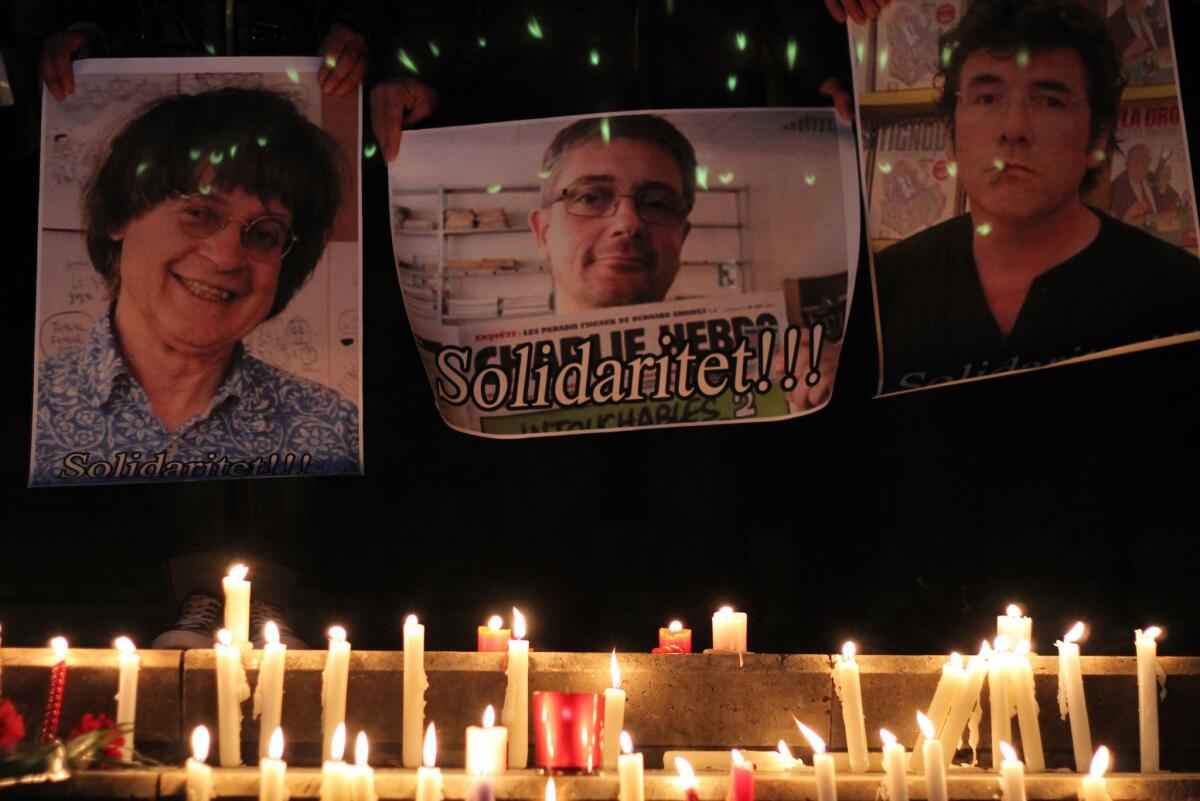Critic’s Notebook: Killings at French journal Charlie Hebdo are assault on freedom

- Share via
Once again, our French allies have died fighting fascism.
The horrific killing of 12 people including journalists with the French satirical magazine Charlie Hebdo and two police officers by three gunmen shouting “God is great!” in Arabic is not just the latest bloody chapter in what some would characterize as religious war, or yet another blow against the freedom of the press.
It’s part of an older war. The players may be different, along with the rhetoric and the strategy, but the essentials remain the same: totalitarianism versus a free society, humanity versus barbarity.
It’s a war we want to believe we’ve already won. Nostalgia for the Allied victory in World War II and the fall of the Iron Curtain fuels popular books, films and television shows.
And though it’s important to celebrate the resilience of the occupied French (Anthony Doerr’s “All the Light We Cannot See”), American hero Louis Zamperini (“Unbroken”) or even the complexities facing the Soviets (“The Americans”), the battle continues. Not on the beaches and in the fields this time, or at least not yet, but on the streets and now in the newsrooms.
The slain staff members of Charlie Hebdo died because they would not surrender the hard-won, and relatively new, freedoms of democracy.
Here’s an easy definition of democracy: People don’t get killed for saying something. Or writing something. Or drawing, photographing or filming something.
This doesn’t mean that certain things that are said, written, drawn, photographed or filmed won’t be offensive. Perhaps, they will be to many, perhaps even criminally so — there are hate-speech laws, in the U.S. and in other democratic countries.
But when thoughts and ideas are not countered by other thoughts and ideas and, instead, by indiscriminate violence, military force or even cyber hacking, that’s another form of fascism. And whether the acts are carried out under the banner of God or government, it’s the antithesis of modern civilization — and not, it must be pointed out, an elemental force or inescapable facet of human nature.
In the wake of the slaughter at the Charlie Hebdo offices, a number of Americans, commenting online, seemed to think terrorism was the obvious predictable response to the magazine’s decision to feature the author of a book imagining an Islamic-extremist take over of France. “What did they think would happen?” was an alarming refrain.
As if freedom of the press, speech and expression were things that should be curtailed if they might anger murderous, crazy people.
As if the whole point of freedom of the press, speech and expression weren’t to keep murderous crazy, people, including freely elected murderous, crazy people like Adolf Hitler, from controlling the socio-political discourse.
As if the first sign of fascism weren’t the limitation of free speech.
Americans are often accused of ignoring history, even our own. Just as many of us assume the world speaks English, we often assume everyone is allowed to speak their minds.
We are more than occasionally shocked to learn that this is not the case in many countries and wonder what is wrong with “those people.” We dutifully celebrate our nation’s birth every year, but we forget what it means: that this democracy, which in turn informed most of the world’s democracies, was born of bloody, frightening, and only miraculously won, revolution.
This was achieved less than 250 years ago, the width of an eyelash on humanity’s timeline.
The journalists of Charlie Hebdo, while exceptionally brave and rigorous, could have been any journalists. Indeed, in the digitally led age of the citizen reporter, they could have been anyone expressing an opinion through a blog, Twitter, Instagram or any sort of social media.
When the fascists attack, the first thing they do is silence the press. We should know. We’ve seen it before.
Twitter: @marymacTV
More to Read
The biggest entertainment stories
Get our big stories about Hollywood, film, television, music, arts, culture and more right in your inbox as soon as they publish.
You may occasionally receive promotional content from the Los Angeles Times.











